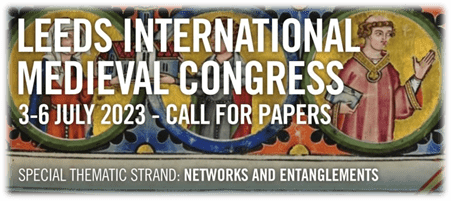October 2022 & February 2023 | BIPS Travel Grant
International Medieval Congress (IMC), Leeds, 3rd – 6th July 2023: Panel Strand – ‘Roman and Sasanian Networks and Entanglements’
In 2021, Domiziana and I decided to establish a dedicated panel strand towards discussing Roman and Sasanian relations at the International Medieval Congress, held annually at University of Leeds campus. Our inaugural set of four panels were a major success and through the generous support of BIPS we were able to award our speakers full registration fee reduction. The full report can be read at this link.
In 2022, we continued to host four dedicated panels on Roman and Sasanian matters. We did not have time to apply for BIPS funding for our 2022 speakers, however, we still consider these panels as part of our ongoing legacy with BIPS and Leeds. These were equally successful with new and returning speakers taking part and presenting their important research; further developing our understanding of the Late Antique Near East. We found that we were starting to create a community, and opportunity, for Roman and Sasanian (junior and senior) scholars at this event, and therefore this spurred Domiziana and I to run these panels annually and into 2023…
Domiziana and I were thrilled to receive BIPS’ support once again for our panel strand – allowing us to cover our speaker’s full registration fees and my personal travel to the event. Our panel strand took place on Tuesday 4th July, and we had a great day discussing all things Roman and Sasanian!
 Our speaker’s papers varied in topics and approaches, encompassing aspects of political, religious, military, economic, and geographic perspectives on Roman and Sasanian relations. We had papers examining the western powers, notably the Huns and Ostrogoths, and their military and diplomatic interactions with the Sasanians in the fourth and fifth centuries. The political and cultural implications of material culture were also evaluated within the geographic context of Mesopotamia and modern Georgia, formerly Kartli and Iberia. Religion also played an important part, and we had papers that discussed the political and religious significance of Roman-Sasanian relations through the act of Martyrdom, but also the use of relics for royal legitimacy. The strand also had papers on court networks as well as those within the military communities along the frontier. The day was a true celebration of our developing, and diverse, understanding of macro and micro aspects of Roman-Sasanian interaction.
Our speaker’s papers varied in topics and approaches, encompassing aspects of political, religious, military, economic, and geographic perspectives on Roman and Sasanian relations. We had papers examining the western powers, notably the Huns and Ostrogoths, and their military and diplomatic interactions with the Sasanians in the fourth and fifth centuries. The political and cultural implications of material culture were also evaluated within the geographic context of Mesopotamia and modern Georgia, formerly Kartli and Iberia. Religion also played an important part, and we had papers that discussed the political and religious significance of Roman-Sasanian relations through the act of Martyrdom, but also the use of relics for royal legitimacy. The strand also had papers on court networks as well as those within the military communities along the frontier. The day was a true celebration of our developing, and diverse, understanding of macro and micro aspects of Roman-Sasanian interaction.
The panels were once again well attended with between 30-40 attendees present throughout the day, with most staying for all the papers. We were very happy that our panels also attracted several leading scholars within the field and those in adjacent disciplines. Discussion was thought provoking, which continued over drinks at the pub after the panels concluded. We are elated these panels were once again a major success!
Each year we attract international attention and the on-going support and acclaim from our speakers and attendees drives us on to keep this strand alive. We are very happy to have scholars at varying levels of their careers deliver papers, which in turn has allowed us to create a stronger community of researchers within the field of Late Antique Roman and Sasanian history. We look forward to welcoming even more scholars from around the world to join this growing community. For that reason, we are excited to announce this strand will continue into 2024 and we have submitted another four amazing panels to the IMC. The congress theme for 2024 is ‘Crisis’, and therefore our dedicated panels will come under the following strand title: ‘Crisis, Resilience, and Transformation: The Roman and Sasanian World in Late Antiquity.’ If accepted, we look forward to hosting new and returning scholars to Leeds in July 2024.
—
We would once again like to thank the British Institute of Persian Studies for financially covering all our speaker’s registration fees for this year’s event. Their support ensures that all our speakers were able to present their research, gain vital feedback, and create important networks within the field without financial concern.
Domiziana Rossi and Sean Strong are PhD candidates at the University of Cardiff.
